
Logic and Logical Philosophy
Scope & Guideline
Fostering Dialogue in Logical Philosophy
Introduction
Aims and Scopes
- Formal Logic Systems:
The journal publishes research on various formal logic systems, including classical, non-classical, many-valued, and modal logics. This includes discussions on semantics, completeness, and soundness of these systems. - Philosophical Foundations of Logic:
Contributions often explore the philosophical implications of logical systems, addressing foundational questions about truth, validity, and inference. This includes works on the relationship between logic and cognitive science. - Applications of Logic:
There is a consistent focus on the applications of logic in fields such as computer science, artificial intelligence, and linguistics, highlighting the practical utility of logical frameworks. - Innovative Logical Frameworks:
The journal is known for introducing and exploring innovative logical frameworks, such as justification logic and paraconsistent logics, which challenge traditional understandings of logical consistency. - Interdisciplinary Approaches:
Papers often employ interdisciplinary approaches, combining insights from mathematics, philosophy, and cognitive science to address complex logical problems.
Trending and Emerging
- Epistemic Logic:
There is a notable increase in papers focusing on epistemic logic, particularly in relation to knowledge representation and reasoning about belief, reflecting growing interest in the intersection of logic and cognitive science. - Paraconsistent Logics:
Research on paraconsistent logics has become more prominent, addressing the need for logical systems that can handle contradictions without collapsing into triviality, which has significant implications for philosophical debates. - Dynamic Logic:
Dynamic logic, particularly in relation to knowledge and belief changes over time, has emerged as a key area of interest, suggesting a shift towards understanding logic in more fluid and context-sensitive environments. - Applications of Logic to Ethics and Normativity:
There is an increasing focus on applying logical frameworks to ethical reasoning and normative theories, illustrating the relevance of logic in addressing moral and decision-making challenges. - Innovative Semantics:
Innovative approaches to semantics, including game semantics and procedural semantics, have gained attention, indicating a trend towards exploring how semantics can inform and expand the understanding of logical systems.
Declining or Waning
- Classical Logic:
There appears to be a waning focus on classical logic as a standalone topic, with fewer papers dedicated solely to its principles. This shift may be due to the exploration of more diverse logical systems and the desire to address contemporary issues. - Historical Logic:
Research on historical perspectives of logic, such as comprehensive analyses of historical figures like Frege or Russell, has decreased, possibly as the field moves towards more modern applications and theoretical advancements. - Basic Proof Theory:
Basic proof theory, which was once a staple in discussions of logical systems, seems to be less frequently addressed, as the journal gravitates towards more complex and applied forms of proof systems.
Similar Journals

Australasian Journal of Logic
Cultivating insights that shape logical research.The Australasian Journal of Logic is a prominent scholarly publication in the field of logic, published by the Australasian Association for Logic. With an ISSN of 1448-5052, this journal serves as a vital platform for disseminating research that advances the understanding and application of logical theory and its intersection with various disciplines. Although it is not open access, its rigorously peer-reviewed articles cater to academics, researchers, and students keen on exploring contemporary issues in logic both in theoretical and practical domains. The journal aims to foster scholarly communication and collaboration within the logic community, encouraging the exchange of ideas and insights that shape the future of logical studies. By contributing to the growing body of knowledge in this essential field, the Australasian Journal of Logic plays a crucial role in enhancing the intellectual landscape of logic research.
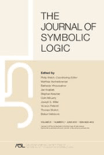
JOURNAL OF SYMBOLIC LOGIC
Pioneering Innovations in Symbolic LogicThe JOURNAL OF SYMBOLIC LOGIC, published by Cambridge University Press, stands as a leading platform for scholarly discourse in the realms of logic and philosophy. With a rich history dating back to 1938, this esteemed journal is dedicated to presenting cutting-edge research that pushes the boundaries of knowledge within symbolic logic and its applications. In 2023, it proudly holds a distinguished Q1 ranking in both Logic and Philosophy categories, reflecting its high impact and relevance in the academic community. Researchers and academics benefit from its rigorous peer-review process and contributions from leading scholars worldwide, ensuring the dissemination of high-quality research and critical theories. While the journal currently does not operate under an open access model, it remains a pivotal resource for professionals seeking to deepen their understanding of logical theories and philosophical inquiries. Explore the JOURNAL OF SYMBOLIC LOGIC to engage with scholarly articles that challenge conventional thought and inspire future research.
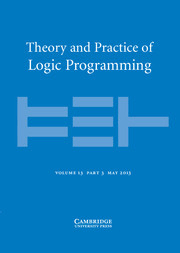
THEORY AND PRACTICE OF LOGIC PROGRAMMING
Advancing the Frontiers of Logic Programming.THEORY AND PRACTICE OF LOGIC PROGRAMMING, published by Cambridge University Press, is a premier academic journal that delves into the evolving field of logic programming, offering insights and advancements from 2001 to 2024. With an ISSN of 1471-0684 and an E-ISSN of 1475-3081, this journal serves as a vital resource for researchers, professionals, and students interested in areas such as artificial intelligence, computational theory, and software development. In 2023, the journal was recognized for its excellence, achieving Q1 status in Computational Theory and Mathematics and Q2 in several other categories, underscoring its significant impact within the academic community. Despite not being open access, its robust content, curated by esteemed scholars, guarantees high-quality research and innovative methodologies that are crucial for advancing the field. The journal's rigorous peer-review process and its standings in Scopus rankings further emphasize its relevance and authority, making it a quintessential platform for disseminating key findings and fostering scholarly dialogue.
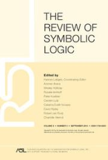
Review of Symbolic Logic
Illuminating the Path of Symbolic InquiryReview of Symbolic Logic is a prestigious academic journal published by Cambridge University Press, dedicated to advancing the field of logic through critical analysis and innovative research. Established in 2008, the journal has become a key fixture in the academic community, particularly recognized for its contributions in the realms of logic, mathematics (miscellaneous), and philosophy. With an impressive classification of Q1 across multiple categories in 2023, it ranks within the top echelons of its field, standing at 15th out of 41 in Logic and 29th out of 90 in miscellaneous mathematics, positioning itself as essential reading for scholars and practitioners alike. Although not Open Access, the journal offers robust access options through institutional subscriptions, providing an expansive platform for the dissemination of high-quality research. Review of Symbolic Logic aims to foster a deeper understanding of symbolic logic's applications and implications while inspiring emerging scholars and seasoned researchers to further the dialogue within this vibrant area of study.

JOURNAL OF LOGIC AND COMPUTATION
Exploring the Nexus of Theory and TechnologyJOURNAL OF LOGIC AND COMPUTATION, published by Oxford University Press, is a leading peer-reviewed journal dedicated to advancing research in the intersections of logic, computation, and theoretical frameworks of computer science. With an ISSN of 0955-792X and an E-ISSN of 1465-363X, the journal has established itself within academic circles, boasting significant impact evidenced by its category quartiles, including a Q1 ranking in Arts and Humanities (miscellaneous) and a Q2 in Logic for 2023. This prestigious journal emphasizes interdisciplinary approaches to understanding computational systems, hence targeting a diverse audience of researchers, professionals, and students keen on exploring provocative questions in logic and computation. Although not open access, the content is highly valuable, reflecting contemporary challenges and advancements in the field. With over three decades of published work, spanning from 1990 to 2024, the journal continues to contribute richly to the discourse surrounding logical methodologies and computational innovations, making it an essential resource for those engaged in these dynamic areas of study.

Filosofiya-Philosophy
Challenging Perspectives, Inspiring DialogueWelcome to Filosofiya-Philosophy, an esteemed academic journal dedicated to advancing the field of philosophical inquiry. Published by NATSIONALNO IZDATELSTVO AZ BUKI, this journal aims to foster scholarly exchange and promote critical discussions on various philosophical themes and issues, including but not limited to metaphysics, ethics, logic, and epistemology. With its commitment to rigorous research and thought-provoking analyses, Filosofiya-Philosophy seeks to engage researchers, professionals, and students alike, enriching the discourse surrounding philosophical studies. Although currently not an open-access journal, it provides valuable insights that are crucial for the continuous exploration of philosophical ideas. Based in Sofia, Bulgaria, it plays a vital role in the dissemination of philosophical knowledge, inviting submissions from around the globe to enhance its academic community and further its impact in the realm of philosophy.
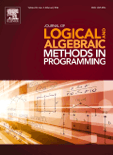
Journal of Logical and Algebraic Methods in Programming
Advancing the Future of Computational Theory and Logic.The Journal of Logical and Algebraic Methods in Programming (ISSN: 2352-2208, E-ISSN: 2352-2216) is a prestigious publication by Elsevier Science Inc, dedicated to advancing the fields of computational theory, programming logic, and mathematical methodologies. Esteemed in its commitment to high-quality research, this journal holds a Q2 ranking in 2023 for Computational Theory and Mathematics, and is recognized in various other disciplines including Logic and Software Studies. The journal’s open access policy enhances its visibility and accessibility, ensuring that cutting-edge research reaches a wider audience of researchers, professionals, and students. With an impressive convergence timeline from 2014 to 2025, it is a vital resource for those seeking to explore innovative algorithms and their applications in diverse areas of informatics. The Journal of Logical and Algebraic Methods in Programming represents a unique intersection of logic, mathematics, and software, carving a significant place in the scholarly discourse of theoretical computer science.
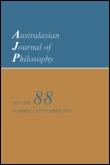
AUSTRALASIAN JOURNAL OF PHILOSOPHY
Cultivating Innovative Ideas for a Modern AgeAustralasian Journal of Philosophy, published by Routledge Journals, Taylor & Francis Ltd, serves as a premier platform for scholarly discourse in the field of Philosophy. With its origins dating back to 1947, this esteemed journal maintains a rich tradition of fostering high-quality, peer-reviewed research and is recognized for its significant contribution to the philosophy community. Holding a distinguished Q1 ranking in the field for 2023 and standing at #75 out of 806 in the Scopus Arts and Humanities ranking, it occupies a vital niche in advancing philosophical knowledge and inquiry. Although the journal is not open access, it periodically offers articles that contribute to the dissemination of philosophical thought, making it a valuable resource for researchers, professionals, and students alike. The AUSTRALASIAN JOURNAL OF PHILOSOPHY continues to inspire and challenge thinkers worldwide as it presents critical analyses, innovative ideas, and rigorous arguments, ensuring its relevance and importance in contemporary philosophical discussions.
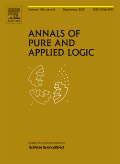
ANNALS OF PURE AND APPLIED LOGIC
Fostering Innovation in the Realm of LogicANNALS OF PURE AND APPLIED LOGIC is a premier academic journal published by Elsevier, specializing in the foundational aspects of logic since its inception in 1974. With a strong commitment to disseminating original research, the journal focuses on both pure and applied logic, making significant contributions to the fields of mathematics and computer science. The journal is recognized for its rigorous peer-review process and is currently ranked Q1 in Logic, reflecting its status among the top-tier publications in the discipline. Researchers will find valuable insights and advancements in logical theory and practice in its pages, while the journal's Scopus ranking further positions it strategically within the mathematical logic community. Although it is not an open-access publication, it offers convenient access options for institutions and subscribers, ensuring a wide reach for groundbreaking findings. The ANNALS OF PURE AND APPLIED LOGIC continues to be an essential resource for professionals, students, and academics alike, facilitating a deeper understanding of logical frameworks and their applications.

Journal of Logic Language and Information
Fostering Critical Discourse in Language and Information TheoryThe Journal of Logic Language and Information, published by SPRINGER, stands as a leading interdisciplinary platform dedicated to the exploration of the interconnections between logic, language, and information theory. With a history spanning from 1992 to 2024, this esteemed journal provides a vital forum for researchers, professionals, and students in fields such as Computer Science, Linguistics, and Philosophy. Notably recognized in the 2023 rankings, it holds a Q2 quartile in Computer Science (miscellaneous) and Q1 quartiles in both Linguistics and Language, and Philosophy, reflecting its high academic quality and relevance. Despite its nuanced focus, the journal's diverse scope attracts a global readership, encouraging innovative research and critical discourse. Although it is not an Open Access publication, the Journal's valuable contributions can be accessed through various institutional subscriptions, ensuring that its scholarly output remains influential within the academic community.